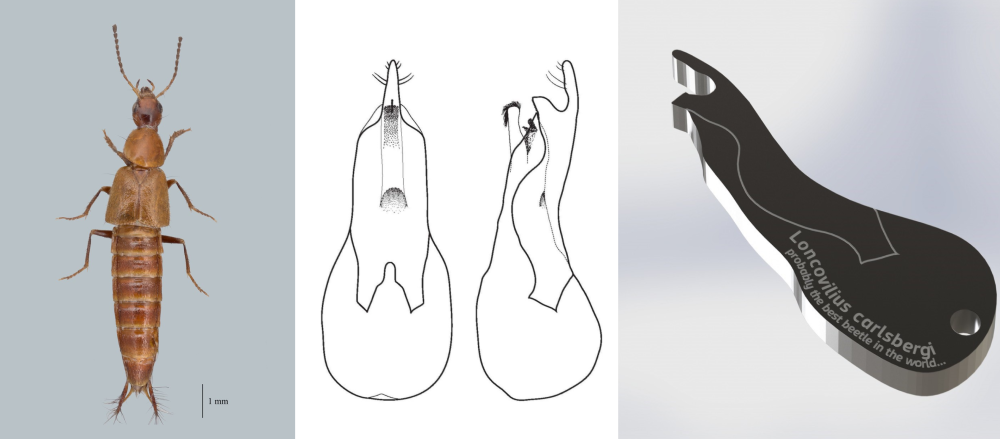A penis is making waves among the entomological community as a new species of beetle has been discovered with genitalia shaped like a bottle opener. The beetle with the peculiar pecker has been named Loncovilius carlsbergi in honor of the Carlsberg Foundation, which the researchers say has lent significant support to their investigations.
“This species is characterized, among other things, by the fact that the male’s sexual organ is shaped remarkably like a bottle opener,” said study author Aslak Kappel Hansen in a statement. “Therefore, we thought it is obvious to dedicate this species to the Carlsberg Foundation, which has generously supported independent research for many years. Their support for various projects, expeditions, or purchase of the scientific instruments at the Natural History Museum of Denmark contributes to the discovery of new species on our planet.”
The new-to-science beetle species belong to the genus Loncovilius, which makes up the rove beetles. They were discovered through close inspection of museum specimens that had been knocking about in the Natural History Museum of Denmark and other insect collections across the world for decades.
Exactly why the bottle-opener-shaped penis is quite so bottle opener-like the researchers aren’t yet sure, but it demonstrates how these appendages can come in handy when trying to tell different species apart.
“Genitalia are the organs in insects that evolve to be different in every species. As such, they are often the best way to identify a species,” explained biologist Aslak Kappel Hansen of the Natural History Museum of Denmark. “That’s why entomologists like us are always quick to examine insect genitalia when describing a species. The unique shape of each species’ genitals ensures that it can only reproduce with the same species.”

The new species of Loncovilius carlsbergi next to a diagram of its penis and a rendering of a bottle opener sketched from its genitals.
Image credit: José L Reyes-Hernández et al. (left, center), and Mads Krabbe Sørensen (right)
The rove beetles are an important bunch, ecologically speaking, because they like to hang out on flowers in Chile and Argentina. Most other beetles in their family prefer to live among the leaf litter on the forest floor, as well as under bark and on fungi.
Despite their significance, little is known about these species and it’s estimated that those we have found may be vulnerable to climate change. As such, it becomes a race to identify them before it’s too late, as well as trying to learn how best to mitigate the effects that threaten their survival.
It’s a grim thought, but one that we need to raise awareness of.
“It’s important that we recognize the vast wealth of yet to be researched species around us before it’s too late. We would like for people around the world to talk about the crisis facing our planet’s species,” concluded Kappel Hansen. “A move towards serious learning and awareness may be sparkled by a light chat that takes place over a beer.”
And if you’ve ever wanted to crack open a cold one with a beetle’s penis, the good news is that the researchers are working towards getting their stainless steel replica into production. Cheers to that!
The study is published in the Zoological Journal of the Linnean Society.
Source Link: Beetle With Bottle-Opener-Shaped Genitals Among Six New-To-Science Species